No dog owner likes to see their precious pup stressed out. But sometimes things that can be scary to pets — like loud noises and car travel — are unavoidable. Luckily, there’s a natural, plant-based, dog-safe way to treat a pet’s anxiety: it’s called cannabidiol, or CBD.
If you’ve ever used CBD products, you know that while they don’t create a “high,” they can turn down the dial on stress, worry, and fear. Emerging research suggests that CBD oil can give pets the same feeling. But how can you find the best dog CBD for your canine companion?
It’s important to exercise careful judgment when shopping for pet CBD oil or dog treats. Studies have found that a shocking number of hemp oil products on the market contain inconsistent levels of CBD — or worse, contaminants like lead and mold. Sticking with trustworthy brands may be crucial for your dog’s safety.
FOCL can help. Our company wouldn’t exist if our founder hadn’t gotten fed up with the difficulty of finding reliable, transparent CBD brands. All of our CBD products, including our pet-friendly CBD oil, are crafted according to strict manufacturing standards and tested for purity by independent laboratories.
We also strive to help customers understand how to make healthy buying decisions, whether they’re using FOCL products or shopping elsewhere. Keep reading to learn where you can find the highest-quality CBD treats, oils, and other dog products to help your pet keep calm.
At a glance:
- Benefits of CBD For Dogs With Anxiety
-
Top CBD Brands For Dog Anxiety
- Best CBD Oil for Dog Anxiety: FOCL
- Best Full-Spectrum CBD: CBDDog Health
- Best CBD Chews: Charlotte's Web
- Best Variety: HolistaPet
- Best CBD Peanut Butter: VetCS
- Best THC-Free Dog CBD Chews: Hemp Well
- Best CBD Dog Biscuits: cbdMD
- Best CBD Treat With Added Nutrients: Honest Paws
- Best for Dogs With Digestive Issues: CBDistillery
- Best Botanical-Infused CBD Dog Biscuits: Penelope’s Bloom
- Best CBD Gummies With CBD Isolate: Medterra CBD
- Frequently Asked Questions
- Treat Your Pet to the Best CBD Oil Brand for Dog Anxiety
The Benefits of CBD For Dogs With Anxiety

While it’s normal for dogs to feel anxious or scared sometimes, they can develop more persistent and problematic anxiety under certain circumstances. This can make them unhappy and lead to disruptive behaviors like furniture chewing, incessant barking, or peeing indoors.
So how can CBD help?
Like most mammals, dogs have an extensive endocannabinoid system, a portion of the nervous system that can be affected by the compounds found in the hemp plant. That includes CBD, which seems to raise the body’s levels of a signaling molecule called anandamide.
Evidence indicates that animals with more anandamide in their systems are less vulnerable to fear and stress. Several experiments suggest that this effect can relieve or protect against canine anxiety problems.
For example, one CBD for dog anxiety study found that a dose of CBD oil reduced fearful behavior during car travel and relieved separation anxiety. Another experiment showed that dogs who were given CBD daily showed significant reductions in their cortisol levels and stress signals.
Further research is needed to fully understand the effects of CBD for dogs. However, based on the existing evidence, there’s good reason to think that using CBD to calm dog anxiety may be effective.
The Best CBD For Dog Anxiety: 11 Top Brands
We’ve put together a list of highly recommended CBD products for dog owners based on our many years of industry experience. Though they all have their pros and cons (which we’ll discuss in detail), we’d happily feed any of the items below to our own pets. Here are the 11 best CBD brands for dog anxiety.
FOCL Premium CBD Pet Drops: Best CBD Oil for Dog Anxiety
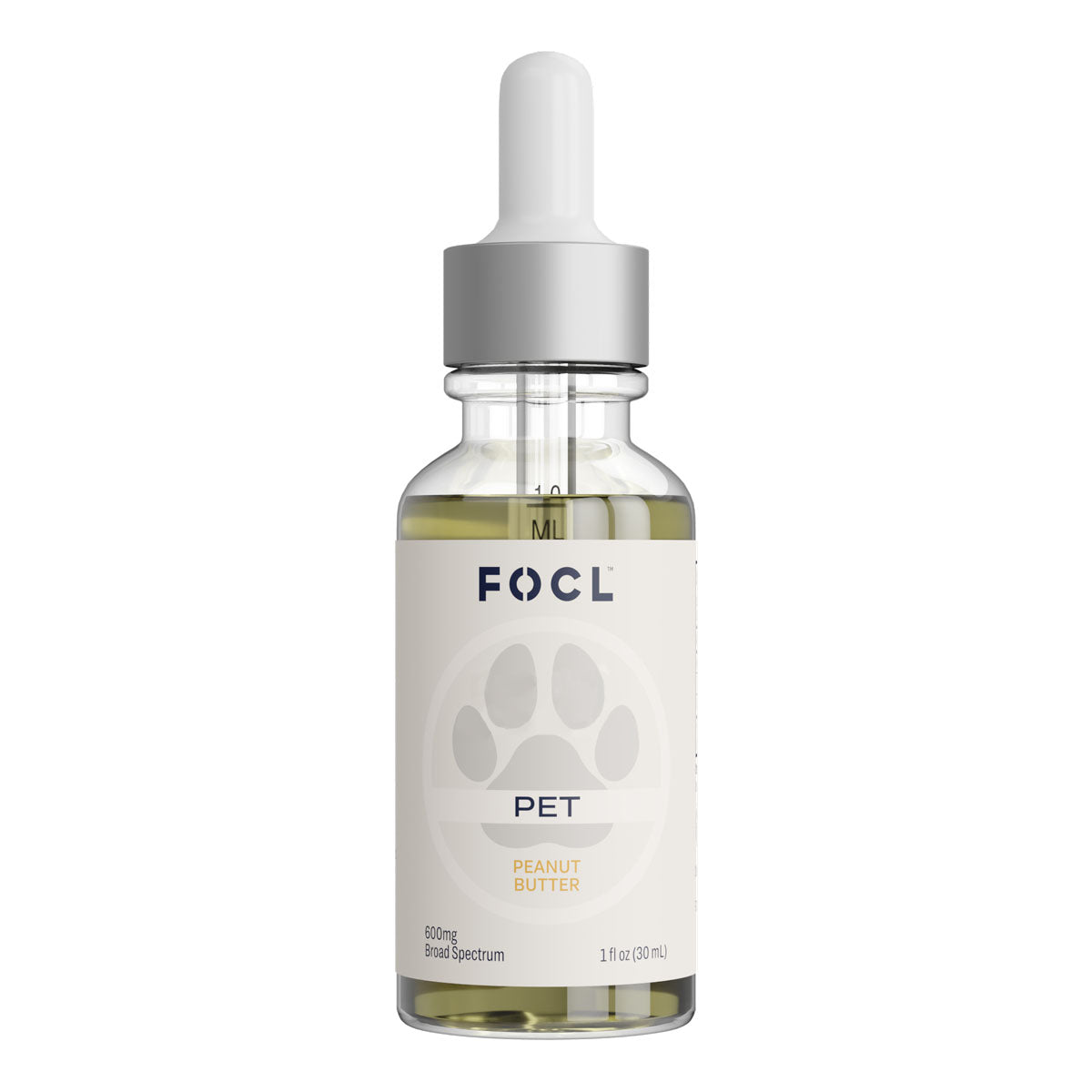
Our premium CBD oil offers peace of mind for both pets and pet parents. Here’s what makes it the top choice for anxious dogs:
CBDDog Health HEAL CBD Oil: Best Full-Spectrum CBD for Dogs
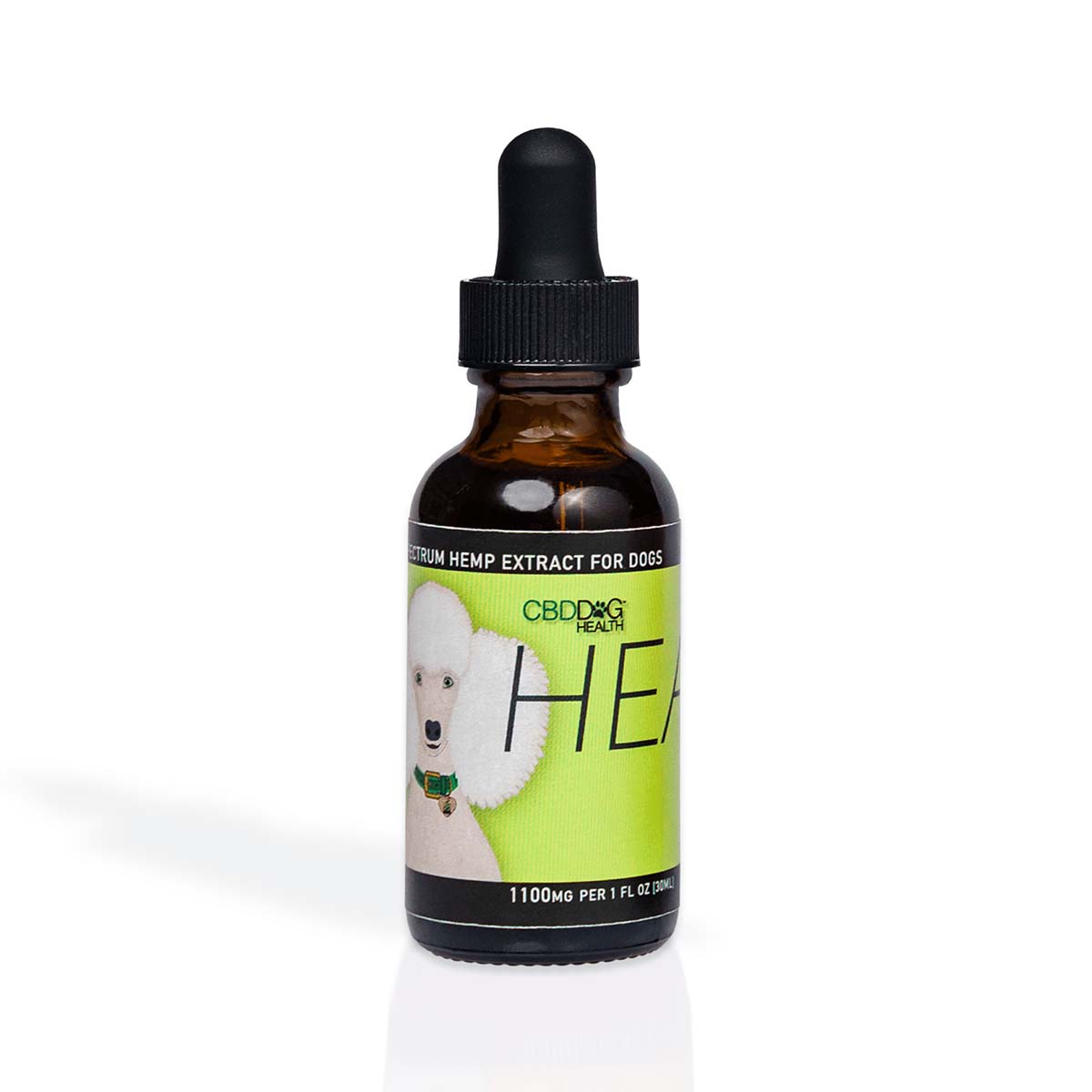
This CBD dog oil checks a lot of our boxes. It’s made with vegan, non-GMO ingredients. It uses a simple, no-nonsense formula. And the company has the testing certificates to back up their claim of being toxin-free. Although the marketing suggests that it’s intended to reduce pain and inflammation, it should also work well for calming down anxious dogs.
One note of caution: CBDDog Health uses full-spectrum CBD oil, which means it contains minute amounts of THC. This may boost the effects of cannabidiol, but THC is also known to be toxic for dogs. The content is low enough that a single dose shouldn’t be harmful, but cannabinoids can accumulate in the body with repeated use.
The HEAL CBD oil also costs $99 for a 1-ounce bottle, which may be a bit steep for some customers. For comparison, our high-strength Pet Drops cost only $39 for the same size container.
Shop CBDDog Health CBD for dogs
Charlotte's Web Calming Chews: Best CBD Chews for Dog Anxiety
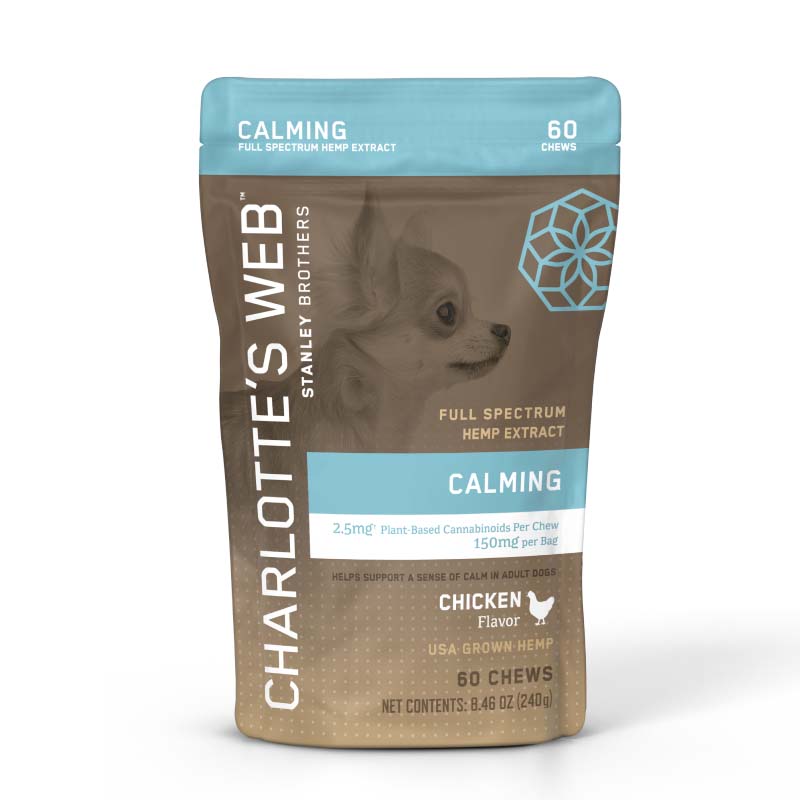
These chewable chicken-flavored CBD dog treats can be a convenient way to give your pet their daily dose of calm. Along with CBD from domestically grown hemp, they include stress-reducing botanicals like Chamomile and Valerian. While the effects of these herbs on dogs haven’t been definitively proven, many pet owners find them helpful.
Charlotte’s Web uses non-GMO hemp and botanicals, although unlike FOCL, they don’t source their ingredients from organic growers. They do use independent testing to ensure their products don’t have harmful contaminants mixed in, with the results available for viewing online.
The Calming Chews contain full-spectrum hemp extract, so as with the CBDDog Health oil discussed above, some caution may be warranted. Use only low doses and monitor your dog to make sure they’re showing no signs of THC toxicity.
Shop Charlotte’s Web CBD for dogs
HolistaPet CBD Oil for Dogs: Best Variety
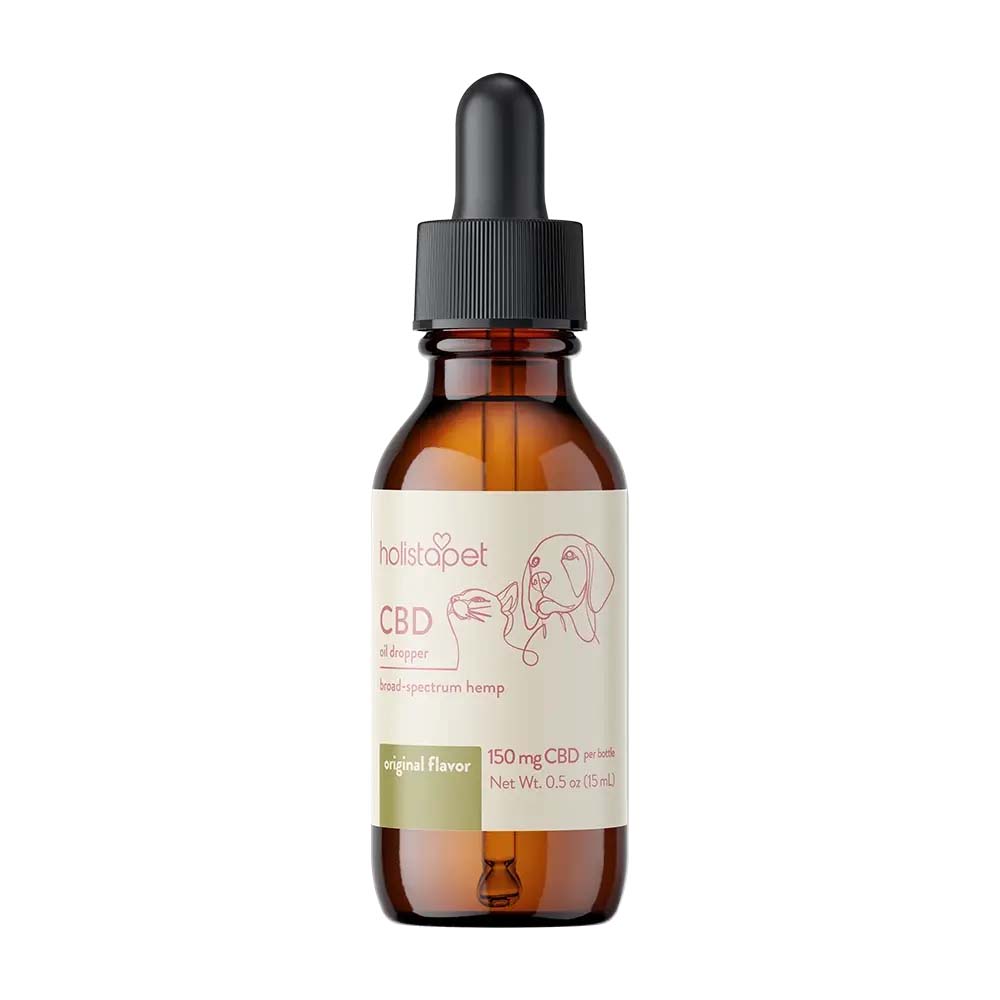
The nice thing about HolistaPets is that they offer their CBD at five different strengths, ranging from a mild 10 mg/ml to a robust 50 mg/ml. This makes it easy to get the right potency for your pup, especially if you have some experience with giving your dog CBD.
Like our own CBD for dogs, HolistaPet’s formula is completely THC-free, so you can feed this to your pet with total peace of mind. It’s also made in the USA with all-natural ingredients.
Though HolistaPet isn’t as costly as the CBDDog Health oil, it’s still somewhat expensive. A bottle containing 600 mg of CBD costs around $60. You can get the same quantity at FOCL for $39 (less with a subscription).
VetCS CBD Calming Peanut Butter: Best CBD Peanut Butter for Dog Anxiety

If you’ve ever struggled to get your dog to take medicine, you probably know that putting it in peanut butter can be a game-changer. VetCS has taken care of Step 1 for you by directly infusing cannabidiol into ready-to-scoop jars of peanut butter.
CBD dog anxiety testimonials from their website confirm that adding hemp doesn’t change how much dogs love peanut butter. This formula is also fairly affordable at around $30 per 8-ounce jar.
Remember that dosing can be somewhat messier with peanut butter compared to CBD oils. Spooning out a glob of peanut butter doesn’t allow as much precision as dispensing tinctures from a dropper. Even CBD treats give you a bit more control since each biscuit should have a roughly identical dose.
Also, VetCS doesn’t allow returns on anything you’ve opened. Unlike with FOCL CBD products, you won’t have the opportunity to test this treat and see whether it works for your dog.
Hemp Well Relief Dog Chews: Best THC-Free Dog CBD Chews for Anxiety
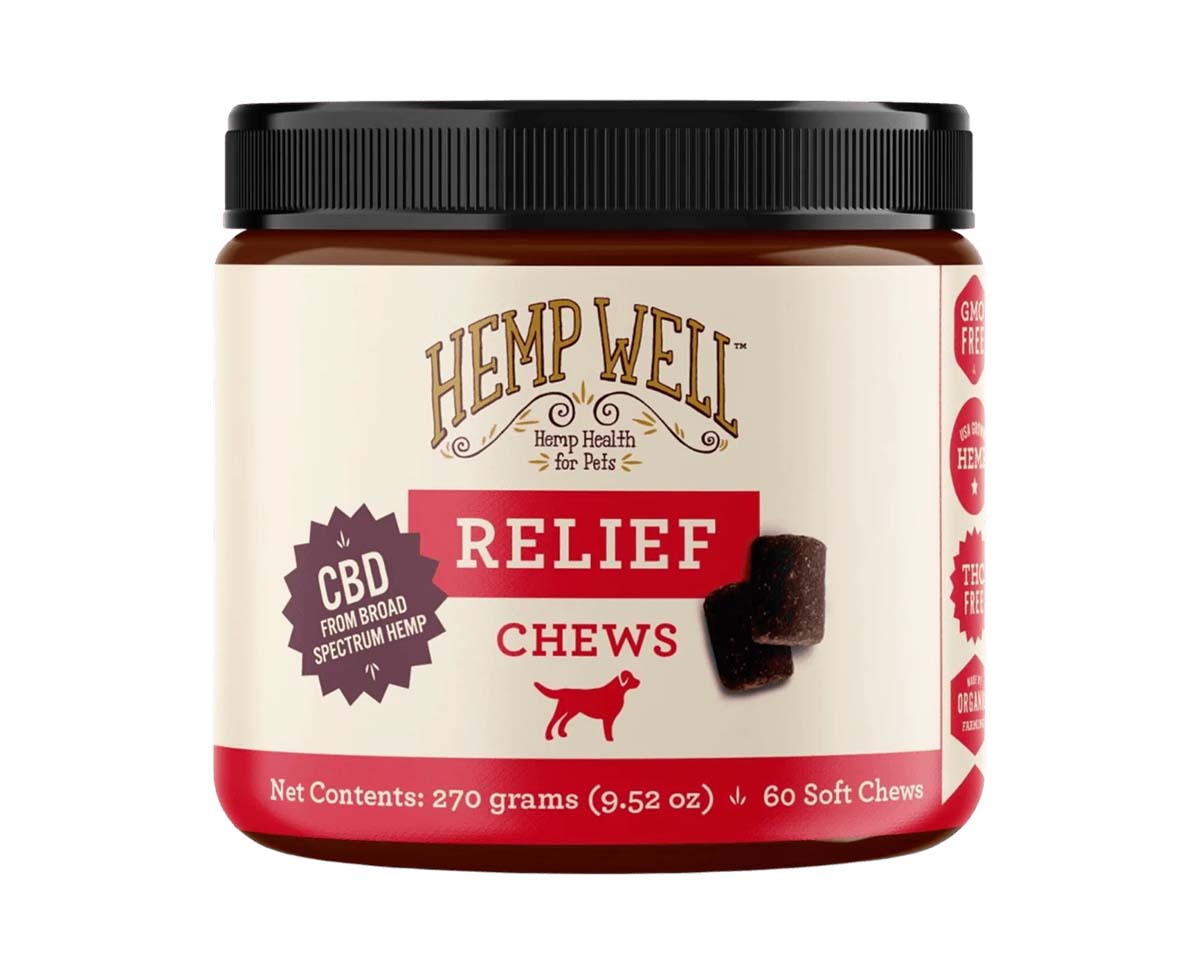
If your dog responds best to chewable CBD treats, but you’re concerned about the possible risks of giving them THC, you might want to give the Relief Chews from Hemp Well a try. Like FOCL Pet Drops, they’re made with broad-spectrum hemp extract rather than full-spectrum CBD. The THC content is zero.
Along with extracted CBD, these dog treats include some hemp powder to provide nutritional support in the form of healthy fatty acids. Some studies have found that supplementing canine diets with hemp may help with things like immune function and antioxidant levels.
The dose of CBD in each Relief Chew is about 3 mg, which is pretty mild. Mid-sized or large breeds might need quite a few to achieve noticeable effects, especially since edible CBD doesn’t absorb as efficiently as a tincture. For bigger dogs, oils might be a better solution than CBD dog treats.
cbdMD CBD Oil Hard Chews for Dogs: Best CBD Dog Biscuits for Anxiety

We’ve covered a lot of squishy, gummy CBD dog treats, but many pups prefer something with a satisfying crunch. If you need a crispy biscuit for your dog to chomp, cbdMD may be worth a look. Their Hard Chews are carefully formulated to offer a consistent concentration of CBD, and most canines will likely love the peanut butter flavor.
These dog treats are available at three different strengths — 5 mg, 10 mg, and 20 mg per chew. That should give you a reasonable option no matter how large your pet is.
There aren’t any detailed dosage recommendations provided on the website, so you may have to figure out the right amount for your dog through trial and error. cbdMD says these products contain other helpful cannabinoids like CBG and CBN, but they don’t specify the amounts. It’s unclear how much effect, if any, these additional ingredients will have.
Honest Paws Calm Soft Chews: Best CBD Treat For Dog Anxiety With Added Nutrients
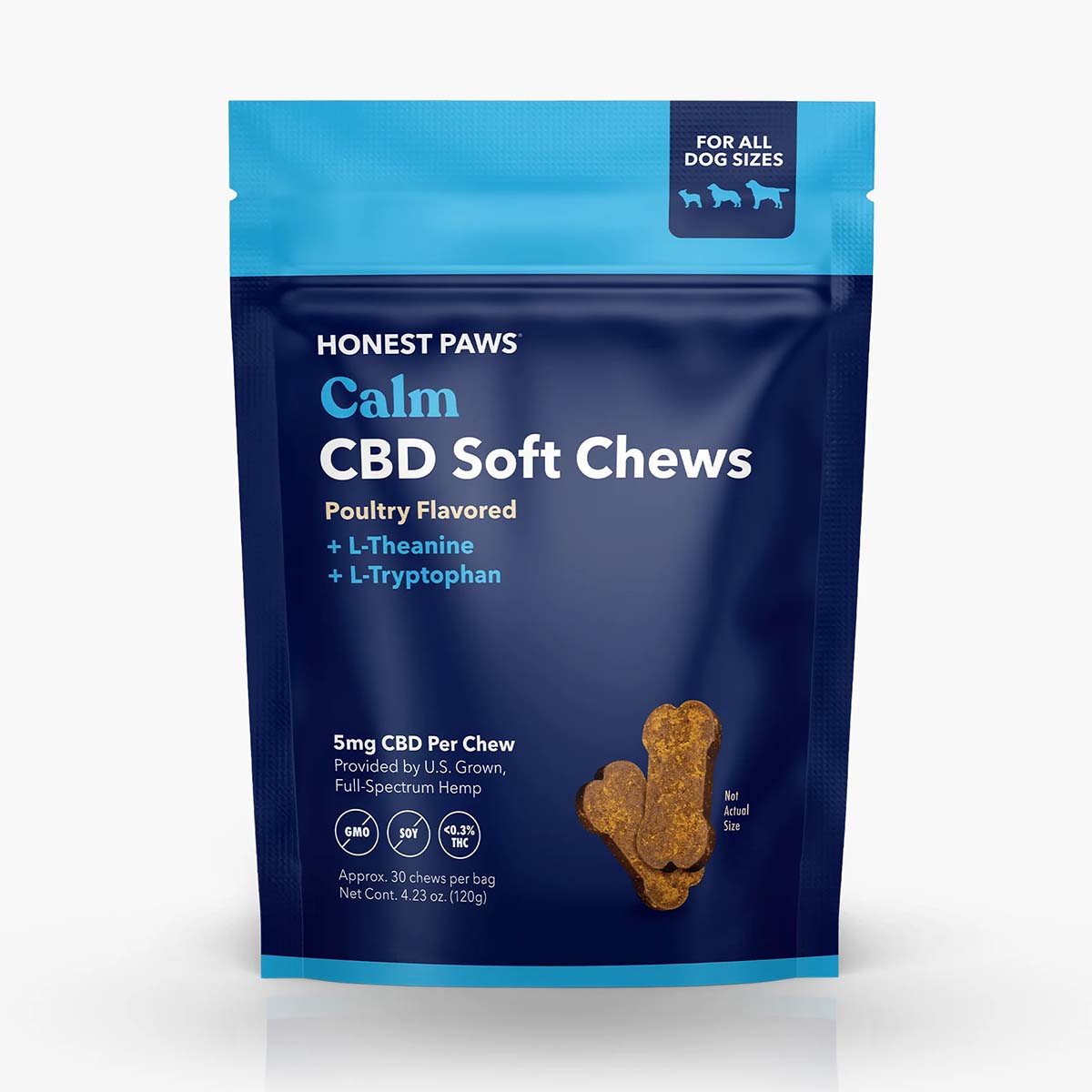
Honest Paws includes some dietary supplements in their CBD dog treats: L-theanine and L-tryptophan. These amino acids are vital precursors to neurotransmitters associated with mood and relaxation. If you’re concerned that your pet’s diet might not include enough of these key nutrients, the Calm Soft Chews could be one way to give them a boost.
There’s no scientific consensus yet about whether tryptophan and theanine supplementation can help dogs with anxiety. However, some studies have shown calming benefits, and it’s not hard to find anecdotal reports from owners who say it worked for them.
Honest Paws dog treats are made without artificial flavors or colors, using organic, natural ingredients. They do include full-spectrum hemp, so you should avoid them if you prefer a completely THC-free option for your anxious dog. The company offers a money-back guarantee, but only for 30 days, which might not be long enough to assess the effects of these chews.
CBDistillery Wag Distilled Pet Tincture: Best CBD Oil for Dogs With Digestive Issues
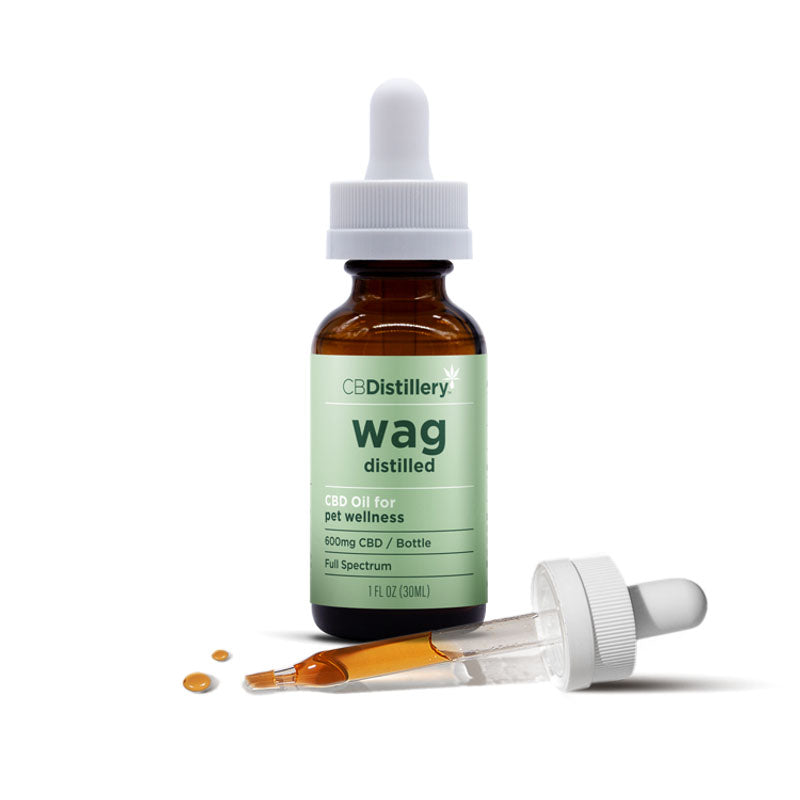
If your dog has had stomach troubles when you’ve tried other CBD oils, they might have an easier time with the Wag Distilled Pet Tincture. While most dog CBD tinctures dissolve their active ingredients in coconut-based carrier oils, this one uses hemp seed oil. This tends to be tolerated well by the doggy digestive system.
CBDistillery has highly reliable quality control and testing procedures, so you can rely on them for clean, safe CBD products. Their Pet Tincture formula is as no-nonsense as it gets, with only two ingredients: hemp seed oil and hemp-extracted CBD.
Note that this means there’s no flavor added. Since the natural taste of hemp can be bitter and earthy, your dog may find this less appealing than some of the CBD treats above. Wag Distilled tincture also uses full-spectrum hemp oil, so it’s not completely THC-free.
Shop CBDistillery CBD for dogs
Penelope’s Bloom Large Dog CBD Treats For Stress + Anxiety: Best Botanical-Infused CBD Dog Biscuits For Anxiety

Penelope’s Bloom offers another nice choice for canines who like to crunch. These oven-baked biscuits are packed with several different ingredients meant to soothe dogs with anxiety.
That includes herbal remedies like Chamomile, Valerian Root, and Passionflower, as well as L-theanine and L-tryptophan to help support a calmer nervous system. There’s also GABA, a chemical messenger your brain uses to signal relaxation.
And, of course, each biscuit contains 20 mg of cannabidiol, making these relatively strong CBD dog treats for anxiety. Sadly, they’re also on the expensive side, at around $70 for just 30 treats. Penelope’s Bloom won’t refund you for opened products, so there’s no way to get your money back if your pet doesn’t respond well to these treats.
Shop Penelope’s Bloom CBD for dogs
Medterra CBD Calming Pet Chews: Best CBD Gummies For Dog Anxiety With CBD Isolate

We’ve mentioned already why we think THC-free formulas are safest when using CBD products for dogs. Some pet owners might prefer to go a step further and use a product containing only CBD isolate — meaning no other cannabinoids at all.
Medterra’s Calming Pet Chews could be a good choice. Each one has a healthy 10 mg dose of CBD, plus some L-tryptophan and L-theanine for added nutritional support. They also include botanicals like Valerian and Ginger to help reduce your dog’s anxiety and ease their digestion.
Though CBD isolate is a more straightforward formula, some research suggests it may not work as well as broad-spectrum CBD oil. The additional terpenes and cannabinoids in the cannabis plant may elevate the overall effect of CBD. Medterra’s 30-day trial guarantee might also not give you enough time to see how their products affect your pet.
Frequently Asked Questions

Does CBD actually help with dog anxiety?
As we reviewed above, there’s not a firm scientific consensus on whether CBD can treat anxiety in dogs. But early studies have shown promise, and many owners have found that their pets seem much less worried and stressed when they’re taking CBD products.
Do veterinarians recommend CBD for dogs?
Professional organizations like the American Veterinary Medical Association (AVMA) have so far been hesitant to recommend CBD for dogs without more research. However, many individual vets believe CBD products can help dogs with issues like pain, mobility, and anxiety. You may be best off asking your dog’s treatment provider what they think.
Are CBD chews or oils better for dog anxiety?
That depends! CBD oils tend to have faster, stronger effects than edibles of the same strength, especially if you apply them to your pet’s gums. Using an oil-based tincture may also make it easier to experiment with different doses. However, the effects of CBD dog treats may last longer, and they can be easier to use in training to relieve social/reactive anxiety.
What dosage and strength of CBD is best for dog anxiety?
There aren’t any official recommendations for appropriate CBD dosage in dogs, and the extreme variety among different breeds and individual animals makes it hard to generalize. In general, it’s a good idea to start with a very small dose and increase it little by little until you see the desired improvement.
Our usual advice is to begin with 1-2 milligrams for every 10 pounds of body weight, depending on how severe your dog’s anxiety is. For example, if you have a 55-pound dog who’s only mildly nervous, you could use 5.5 mg of CBD. If they’re seriously anxious, you could use 11 mg.
If the symptoms haven’t improved after a week or so, you can increase the dose by a half-milligram for every 10 pounds.
How quickly does it take for CBD to work for dog anxiety?
CBD can have both short-term and long-term effects on anxiety. If you’re applying CBD oil under your dog’s tongue, inside their cheeks, or on their gums, it should absorb more quickly. You may see results within 25-55 minutes. If you’re feeding it to them in a treat or by adding oil to their food, it may take 45-90 minutes.
Once you start using CBD regularly, you will likely notice a reduction in your pup’s baseline anxiety — they’ll be calmer overall, not only after their daily dose. This can take anywhere from 3-6 weeks.
Is CBD or anxiety meds better for dog anxiety?
Although some people like CBD because it generally has milder side effects than prescription medicines, it also doesn’t have the firm research backing of other medicines. If your dog has a prescription for anxiety, don’t switch to CBD without consulting your vet.
Is there a difference between dog CBD and regular CBD?
CBD is the same whether it’s given to humans or dogs, but CBD pet products are generally formulated based on the specific preferences and needs of animals.
Should dogs have CBD every day?
A daily dose of CBD might not be right for every dog, but studies suggest that it’s generally safe — even at considerably higher doses than we’ve suggested above. Taking CBD regularly may help some dogs with persistent anxiety.
Where can you buy CBD products for dog anxiety?
It’s often easiest to buy CBD products for anxious dogs directly from the manufacturers online, though you can also sometimes find them in pet stores. The best dog CBD treats for anxiety will have third-party test results verifying their dosage and showing that they’re contamination-free.
What are the side effects of CBD products for dog anxiety?
Some dogs may experience side effects like:
- Drowsiness and fatigue
- Reduced blood pressure
- Dizziness and disorientation
- Dry mouth
If you notice signs of these problems in your dog, you may want to decrease or discontinue your CBD dosage.
Treat Your Pet to the Best CBD Oil Brand for Dog Anxiety
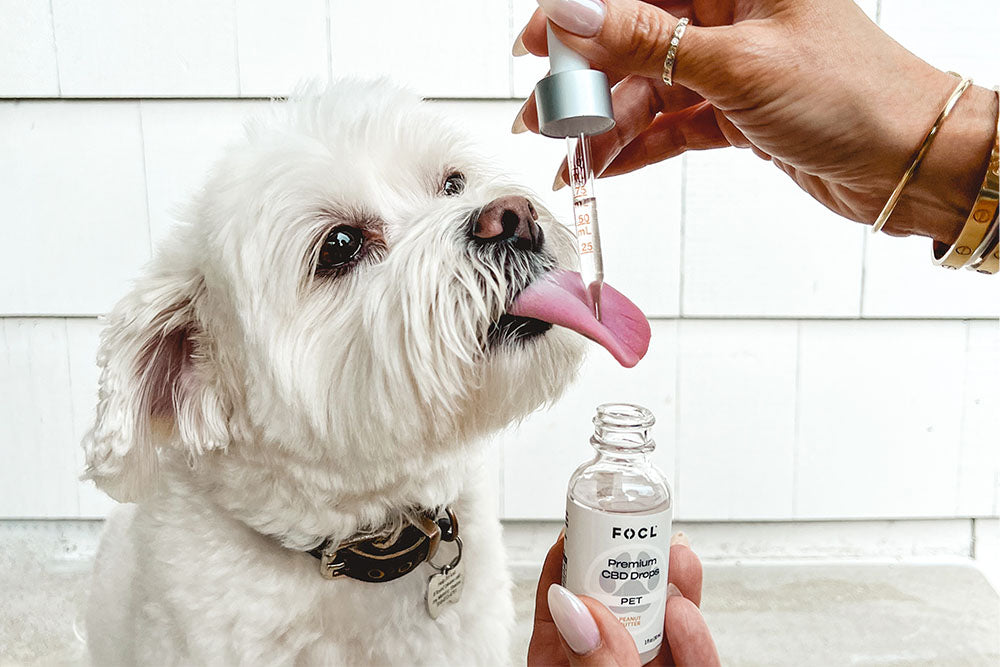
Made from natural, organic ingredients and rigorously tested to ensure purity, FOCL CBD Pet Drops are a fantastic way to help your dog feel calm and secure. And our satisfaction guarantee means you’ll have all the time you need to confirm that they work. Order your first batch here and watch your pet’s cares melt away.





